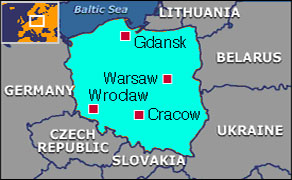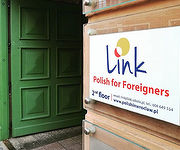Information
Wroclaw may never have lost its ancient Polish element - 20,000 Poles lived here before World War II - but Poles would never have imagined that the city would become a part of the motherland again.
Wroclaw became Polish again by default. Stalin prodded Churchill and Roosevelt into rolling Poland west in 1945. Poland lost the cities of Lwow and Vilnius and gained the bombed out shells of Breslau (Wroclaw) and Danzig (Gdansk). Neither the Germans nor the Poles wanted the move, but they had to make the best of the situation.
The Lwow connection was especially important in the development of today's Wroclaw. Thousands of Lvovians were encouraged to settle there in the late forties, and a host of cultural institutions were reborn, chief among them Lwow's Jan Casimir University.
Wroclaw has grown into a vibrant student city, and Poles from across the country are quick to compliment their Wroclavian brothers - a generosity of spirit that seems rather less pronounced in relations between Varsovians and Cracovians. As it was, Lwow was one of the most cultured and cosmopolitan cities in Old Poland, and much of its spirit has re-emerged in Wroclaw.
The earliest knowledge we have of Wroclaw dates to the ninth century, when a Slavic tribe made a fort here on the delightfully named Tum island. The tribe was soon mopped up by the Czechs, whose legendary ruler Vratislav provided the origins for the city's name.
From henceforth, Vratislavia would change hands dozens of times, with Czechs, Poles, Germans and Austrians all having a bash at conquering and reconquering the city.
The first bishopric was established here in 1000 by Polish King Boleslas the Brave, and a cathedral still stands on the spot of that first edifice. Although Polish remained one of the languages of the street for centuries to come, Wroclaw moved out of the sphere of Polish rule in 1338. Nevertheless, regular changes of regime did not prevent the city from blossoming into one of the richest cities in Central Europe.
Plague and the Thirty Years War set things back during the seventeenth century, throughout which Breslau - as it was now called - belonged to Habsburg Austria. The Prussians then took decisive control over the city after the Seven Years War (1756-63) and besides a brief era of Napoleonic rule, the city remained in the German orbit through the Prussian led unification of Germany during the late nineteenth century.
When war broke out in September 1939, Breslau's population numbered about 630, 000, of which about 20, 000 were Poles. The majority of the city's 20,000 strong Jewish population had already fled the city in the wake of Nazi rule. Those that remained would share the cruel fate of Central Europe's Jews.
The Germans did not give up their city easily. The Soviet attack was launched in January 1945, and the bombardment continued until 6th May. By this stage as much as 70% of the city lay in ruins.
Those Germans who had not already fled were compelled to do so after the Potsdam Conference ruled that Breslau should become Polish. Within a year, as many as 166,000 Poles had arrived, mainly from Lwow (now the Ukrainian city of Lviv).
Rechristened Wroclaw, the city's future was now tied to Poland. However, it would not be for another forty-four years that Poland would be a free country again.
If any trace of a silver lining can be discerned over the wreck of 1945, it must be that Europe is now experiencing its most peaceful epoch in a thousand years. Polish-German relations have been salvaged, and German tourists are warmly welcomed in today's Wroclaw. Let's hope that we don't start beating each other up again.
 Population: 39 million
Capital: Warsaw
Major language: Polish
Major religion: Christianity
Life expectancy: 68 years (men), 77 years (women)
Monetary unit: 1 zloty = 100 groszy
Main exports: Machinery and transport equipment, foodstuffs, chemicals
Average annual income: US $11,300
Internet domain: .pl
International dialling code: +48
Population: 39 million
Capital: Warsaw
Major language: Polish
Major religion: Christianity
Life expectancy: 68 years (men), 77 years (women)
Monetary unit: 1 zloty = 100 groszy
Main exports: Machinery and transport equipment, foodstuffs, chemicals
Average annual income: US $11,300
Internet domain: .pl
International dialling code: +48
About Wroclaw
The Poles belong to the Slavic peoples. The origin of the word 'Slav' has a somewhat inglorious legacy. During the twilight of the first millennium A.D, repeated raids were made into the Central European expanses. The purpose of these raids was to sell captives on the slave (Slav) markets of Constantinople.
Not that the Polish nobility claimed descent from these pagan fellows. Far from it. The Polish gentry believed that they were descended from an ancient warrior tribe known as the Sarmatians, who had swept into Central Europe from the Black Sea Steppe.
But whether or not the nobility ('szlachta') were Slavs or Sarmatians, they eventually absorbed a plethora of different peoples into their ranks, including Armenians, Lithuanians, Ruthenians, Scots and even small groups of Tatars. By the close of the 16th century, Poland had evolved into a hybrid state that was for a time something of a lone democracy amidst a sea of absolutist states. During its heyday, Poland - as the largest and most progressive country in Europe - had a greater degree of religious tolerance than any other European country, a factor which made it a haven for the Jewish diaspora.
Poland was brought to its knees during the mid-seventeenth century by a series of wars on all fronts. The country never quite recovered. Weaknesses in the country's democratic laws were exploited by partisan groups, and Poland drifted into decline. During the late eighteenth century, the spirit of reform permeated large numbers of the nobility. However, this eventually proved too much for Poland's absolutist neighbours, who were wary of a resurrected force in their midst. Led by Catherine the Great of Russia, the Prussians, Austrians and Russians set about dismembering the country. The final partition was completed in 1795.
Whilst two major uprisings were made in the Russian partition (1831, 1863) as well as a brief yet ill-fated alliance with Napoleon Bonaparte, it was not until 1918 that Poland regained her independence. This came in the wake of the Second World War, during which Marshal Jozef Pilsudski (later President) emerged as the nation's champion.
The wobbly period of independence was short-lived. In September 1939, Nazi Germany and Soviet Russia launched a two-pronged invasion that divided up the country. About a fifth of the country perished during the war, including vast numbers of the intelligentsia and a staggering 90% of the country's Jewish population.
After the war, the Soviets set up a communist regime, whose demise was spurred on by the Solidarity protest movement, whose leader, Lech Walesa, won the Nobel Peace Prize in 1983.
Throughout the Cold War era the Roman Catholic Church acted as something of a shepherd of the nation (as it had done in the nineteenth century era of partitions). The country was blessed with a number of visionary spiritual leaders, chief among them Karol Wojtyla, who became the first Polish Pope in 1978. The country had originally been brought into the Christian fold as far back as 966 AD, and today it is one of Europe's most Catholic countries.
The Presidential insignia was finally brought back to Poland in 1989 by the government in exile, which had remained in London since World War II. Lech Walesa became the first democratically elected President of the new era, but his term in office was a difficult one. Poland inherited monumental debts from the Communist era, and the shock of transition was acute. Nevertheless, Poland's economy was sufficiently successful to merit its accession into the European Union in the first wave of that body's expansion in 2004. And in spite of both high levels of unemployment and a number of corruption scandals in the political arena, the country is widely considered as a leader in the region. The baptism of the new Poland may have been by fire, but her borders are now safer than they have been for centuries.
Comments
I was in Wroclaw last summer 2017. I eat the best pizza in Poland. Vesel sem, da so v mestu zopet Poljaki in da se mesto obnavlja in raste.
ReplyHi,I am looking for info on my wifes grandfather who was from Breslau and died in 1960's.His full name: Hermann Fritz Rudolf Ulbrich.He had 3 children named Helmut, Brigitta and Manfred Ulbrich.Any information will be appreciated
ReplyThe word Slav or in Polish Słowianin comes from "the word" or słowo. Słowianin or master of words. Dumb or speechless is in Slavic "Niemiec" from "niemowa" and it is the word for a German.
Replyinteresting history... granfather Willy Muschler, Brieg, Breslau... Anybody know anything perhaps..Died 1945 in strange daylight US bombing raid,Apparently.?
ReplyPLEASE LOWER THE WALL FOR THE BABY HIPPO. I SEEN IT ON THE NEWS STRUGGLING TO GET OUT OF THE WATER. BABIES GET TIRED ALOT N SLEEP ALOT, SO WHEN IT GETS TIRED IT COULD DROWNED. PLEASE LOWER THE WALL TO GET IN N OUT OUF THE WATER. POLAND ZOO
ReplyI agree. Such a disppointment to see all the graffiti and litter just a few steps away from the beautiful Rynek. But litter is not just a problem in Wroclaw. Every 'beauty spot' we visited in Poland - mainly picnic sites on tops of mountains or in wildflower meadows - was blighted by trash mainly, it has to be said, in the form of beer bottles, soft drinks bottles and cigarette butts...) And how difficult would it be for the Tourist Info shop in the Ryneck to sell stamps and have a post box outside? Have you ever tried to find a postbox in Poland?
ReplyWroclaw is a lovely and nice city but covered in graffiti, trash and dog poop. Why aren't there laws to deal with these issues. I loved the Rynek but then I took two steps into a passage way and it was scary with all the graffiti on the walls, doors, and windows. Maybe in time this will change. I hope so.
ReplyWroclaw is a lovely and nice city but covered in graffiti, trash and dog poop. Why aren't there laws to deal with these issues. I loved the Rynek but then I took two steps into a passage way and it was scary with all the graffiti on the walls, doors, and windows. Maybe in time this will change. I hope so.
ReplyUnited Kingdom My Grandfather was born in Breslau 17-09-1875 his namy was Joseph Deinert. I think that his father was the same name though can't swear to that. I also think that his mother was called Dorothea Dienert. He had a sister called Hedwig and a brother but I am not sure of the brothers name. The father and the brother both were conected with the fire service. The brother being a fire fighter and the father head of the service or so I am told. does anybody know if there any way that I can get a copy of his birth cert'?
ReplyMy grt/grt/grt grandfather was Fredrich Stenmuller born Wroclaw 1800 and my grt/grt grandfather Herman was born there around 1833 to 1839. i have old family photo's if anyone wants infomation.
ReplyMy 5x great grandfather was born in Breslau March 30, 1840 according to church records. His name is Franz Roemisch. I don't think he was a member of the Lutheran church until in the US and babtised in 1875. Can anyone help me? I would love to get his birth certificate and know more about his life in Breslau, as I don't think he came to the US until around 1860. Please e-mail me at Lkn4kin@comcast.net as I stumbled upon this list.
ReplyWow... I'll need to read again. My brother is researching our great great grandfathers and we found that Frederick Herman Steinmueller was probably from Breslau (Wroclaw) Any help appreciated. The Steinmuellers emigrated to Australia and the further to new Zealand where we were born.
Replyfirst generation American here desperately seeking information about my fathers family. He left Wroclaw/Breslau in 1939, German Jew with his sister. Last name is Mamlok. Was told my grandfather was in the German Army. Grandmothers maiden name was Lowenstein
ReplyI am looking to trace any relative by the name of Andruszko. My mother was Bronislawa Andruszkowa,married Eugenisz Pirozek.janinaderrick@talktalk.net
ReplyI am searching for info on my ascendants from Breslau. My great great grandfather Jacob Berel born abt 1825 and his wife Marianna Levin were from Breslau. And I have the death certificate of his brother Rino Berel which states he was also born in Breslau in 1827. The name of their parents were Samuel and Rena Berel.
ReplyI am a Real estate agent in Porto Cervo (Sardinya) Italy. I search a contact for Business ( Sales and rent ) of Villas, apartments, plot ecc. in the North of Sardinya, particulary in Costa Smeralda, with Real Estate Agency( Nieruchomosci)in Breslavia - Wroclaw and if possible, Warsaw, Gdansk, Krakow and others towns of Poland. Best regards.
ReplyI am looking for information about Draier Family who lived in Breslau. After WWII all information was lost. My great grandfather's name was Simon Draier, married Johanna Feidels and had a son called Max. I would really thank any information.
ReplyI am looking for information about the Daszkiewicz family,who lived in Wroclawlast known address in 1974.
Replythe previous post I wrote referred to Sept 1939-1945.The Holocaust. My children will never have known any relatives like other children have. I have never known any but my mother and father.. who had lived in Poland for a hundred years. Then GONE. no one left!
ReplyWloclaw is the city my relatives 'who I had never known, lived in. my father s city. He is the sole survivor of 210 person family who was murdered with the help of the neighbors who then took over all the homes and the properties. My mother always asks.. "why did they do this ? they were neighbors !Our children played together ?" So they have a nastiness from knowing their houses were taken from dead people.
ReplyThe site is excellent, offering a clear history of Wroclaw. Thank you. I am an American professor teaching at the University of Dar es Salaam, Tanzania who joined a group of music.dance performers at the Brave Festival in Wroclaw in July 2008. I met a Polish woman and young child from Wroclaw and believe that her husband, the father of the child is a Tanzanian man I taught in 1966 in Tarime, Tanzania. His name is Dr. Mwita Marwa. Does anyone know him or have any information? strumpfmitchel@yahoo.com
ReplyLooking for direction of employment in this beautiful city, so that I can stay and live and die an old man. Help?
ReplyWe stayed for a few days in wroclaw and we love the place !! nice centre , great shopingmals (grunwalski and magnolia) , friendly people, great dinning, whe really hade a great time and we will return !! ps this is a good site to find al the information !!
Replyiam a graduate from the polytechnic with higher national diploma in electrical\electronics pls help me.can i be enroll in any of your universities?
ReplyI'm looking for birth and death records for my family, Harrach. Count Johann Karl, and his son Peter, and his son George (born 1856). I think they were all born in Wroclaw. Hopefully someone can tell me how to do this, or help me. THANKS cfitzpa454@aol.com (my email)
ReplyYou say Poland became independent in the wake of the Second World War in 1918. 1918 was the end of the First World War. I am going to Poland this summer which I look forward to very much. I tried to find out from your website if many Poles speak German but couldn't. I found my ability to speak German in Prague very useful. I am keeping my fingers crossed.
ReplyI am looking for information of my family. They left Breslau just before the Second World War. Can anyone advise on how I can find more about them?
ReplyAre there in the town of Wroclaw or in the near a castel or an old building, where tourists stay, I hear from a friend but I dont know the name of the place. Thank you
ReplyWe don't want any stupid English turists! They don't know how to behave, more... they behave like animals, not like a proper turists so Wroc³aw says: English turists? No, thanks!
ReplyMy Father was born in Breslau, May 5,1919. What channels would I have to go thru to get copies of Birth records, old address's, school,military and etc. After the war we shipped out of Bremerhaven and so far thats as far back as I got until I find this wonderful site. My Father and Mother have both passed on so I could use all the help I can get. My Mother was born in 1923. Vilnius,Lithuania ( I'm not sure of the spelling ) Any info would be greatly appreciated.
ReplyI am looking for the originals of my father´s birth certificate. He was born in Breslau in 1914. Could you give me information on State authorities that I should contact for this?
ReplyThis site gave me some good information.I was originally researching my great great grandparents Homza and learned that they were from Spiska.Now I know something about the country that my great great grandparents lived in.
Reply
 Link Language School
Link Language School
 International High School of Wroclaw
International High School of Wroclaw
 Hard Rock Cafe Wroclaw
Hard Rock Cafe Wroclaw